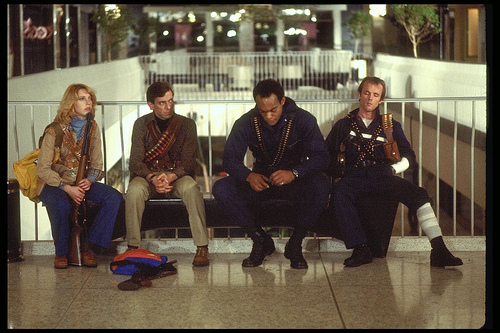Saturday, 25 July 2015
Sunday, 19 July 2015
Pessoa
I feel love for all this, perhaps because I have nothing else to love ... even though nothing truly merits the love of any soul, if, out of sentiment, we must give it, I might as well lavish it on the smallness of an inkwell as on the grand indifference of the stars
Utopia Then (2) Zardoz.
One of the films that best captures the utopian anxieties of the Seventies' is Boorman’s addled farrago Zardoz, excellently summarized here on Wikipedia.
Zardoz isn’t alone of course in expressing pessimism about the rationalised, radically egalitarian Utopia that post war consensus seemed to be leading us into, but it is perhaps the one most explicitly anxious about the loss of masculine vitality, death drive, jouissance, call it what you will and it’s replacement with a feminised, infantilized world in which the men have been rendered literally impotent and can do nothing but mooch about for all eternity longing for a bit of violent death to be visited upon them. They have entered the Apollonian purgatory to which a technocratic, managed economy is leading us where one can neither die of starvation nor boredom.


The thing about the worlds of these Seventies' utopias is that people (or at least, the elites) really do enjoy equality and abundance, material comfort and personal liberation especially in sexual relations, though without taboo or danger these sexual freedoms themselves lose frisson, become dryly technical, passionless encounters. Connery in Zardoz represents the jaded bourgeois eternal longing for a bit of rough, but also, as Phil Knight would have it, the need for sterile, juiceless metropolitan centres to suck some manna and mojo in from the hinterlands, the untermensch, the subaltern. In one sense the decadent, soft and feminized centre in languorous disavowal invites in the barbarian hordes to put it to the sword.
%2Blab.jpg)
These Utopias can not last, are always ambivalent, are based on blood or coercion, exclusion, some "noble lie" or subtle forms of ideological programming, a kind of soft totalitarianism, the fear of social control not as Big Brother but a castrating Big Mother. But beyond its masculinist paranoia, the terror at succumbing to ease and pleasure, the oppressive guilt of having abandoned struggle and the warrior code Zardoz does get at the tensions of the Sixties, both for the systematic derangement of the senses, the refusal to police desire, liberation and also the demand for radical equality and peaceful cohabitation. They will ultimately be corrupted either from without or within, or both, even the deeply ambiguous Utopia of Romero’s shopping mall in Dawn of the Dead has its wall breached by the Hell’s Angels. Human beings just aren't built for Utopia. They always and everywhere dream of scaffolds.

After Zardoz, Westworld, Logan’s Run, Woody Allen’s sublime Sleeper, these clean and almost workless worlds Keynes imagined the great-grandchildren he never had inhabiting, we get primarily, in film at least, dystopia, corporate dystopias in effect, and we also get a great deal of the post-apocalyptic. Awful visions of course, but also thrilling, they admit at least of adventure and heroism, by which we mean violence, by which we mean conquest. Thank god we have escaped a future of drifting through geodesic domes in glittery cubist togas, have revived the frontier spirit and can at last achieve a true Utopian Liberty.
Saturday, 18 July 2015
Shaviro-The Universe of things
It should be evident that beauty is appropriate to a world of relations in which entities continually affect and touch and interpenetrate one another, and that sublimity is appropriate to a world of substances, in which entities call to one another over immense distances and can only interact vicariously.
Wednesday, 15 July 2015
Tuesday, 14 July 2015
Utopia Then! (1)
In a series of superb, ongoing blogposts Anthony Galluzzo breaks down two competing strains of Utopian thinking into the the Flintstones versus the Jetsons. The essence of the argument is an old one but in its present form it harks back to the pre Neoliberal period, and attempt to reclaim certain Lost Futures, re-conceptualize the past thirty years as itself an interregnum which comes to an end in 2008, allowing us to fully get on now with the abandoned projects of yesteryear.
Partly this debate comes across like an academic equivalent of the mods and punks versus the hippies, which is because that’s what it is. Cold, sneering modernists determined to break with the past, rationalists who love mass culture and forms of production against emotionally incontinent organic food lovers and tree-huggers, promoters of the locally produced, the small scale, craft and artisan based.
Galluzzo’s a high flying young academic from Smartsville USA, I am a TEFL teacher, so I won’t pretend I can add much to the debate. Utopia though has been on my mind lately. Partly because I have just finished a Dystopian novel set, as Frankie Boyle would have it, 18 months in the future and have also been writing a Utopian riposte. In thinking about I ended up (as I often do) going back to the Seventies. And Film.
Hegemony aims at making certain terms unthinkable through making them unsayable, erasing them from the social field so they sit trapped in your brain, wilting and diminishing, starved of light and air. One of the things that has been most interesting since the crisis, especially noticeable to people of my age (45) or thereabouts I’d imagine, has been the return of certain terms from exile, not a full return of course these are still in some senses hard words to use in polite or mixed company, to physically utter, but the sense of their obsolescence, their calling up a register of vanished, vanquished concerns and revealing the speaker to be either a clueless atavism or some kind of Stalinist fanatic has cracked open. I am talking about the three C’s here primarily; Class, Capitalism and most extraordinarily of all Communism.
Much the same goes for the word Utopian in a positive register.
The term Utopia is fearful one for all kinds of reasons, for all kinds of different groups. Perhaps the most tedious of these are disillusioned Leftists, morbidly attached, post some banal political disappointment, to a sense of their own superior realism, permanently pursing their lips and attempting to inject a note of centrist caution, brandishing Kant's “from the crooked timber of man, no straight thing was ever made” or Voltaire’s “the perfect is the enemy of the good”. Utopia being essentially at its most benign a form of playful fantasy best confined to children’s books, at its most dangerous a recklessly improvident delusion, any attempt at concrete realization always ending in tears, in ruins or the Gulag.
Neoliberalism is interesting in the sense that it has always occupied the position of a “double-truth”, founded on the impossibility of one Utopian project, the illusory Utopia of a centrally planned economy in the case of the USSR, or in America and Western Europe’s case the Keynesian, Fordist, Social Democratic compact, it is nonetheless obliged to offer up another Utopia in its place, a real Utopia. It’s only in its late phase when the Utopian promise of a shareholder democracy runs aground that the current claim for the status quo, a “realism” that we must manfully accept the least worst and that no matter how much worse it gets we should be grateful for anything at all takes hold.
It was possible in the 70s for the Right to stake out a Utopian vision, one that was expanded in the 90s and that successfully captured and directed Utopian desire.* That fell apart in 2008 and it doesn't have another compelling vision to offer, all the Utopianism now and the mounting sense of a real Utopia that can address the current, what we might call, Utopian deficit, is broadly on the Left. All the Right has is power. That’s not nothing of course but if power alone were enough no change would ever have occurred. And can the kinds of commitment needed for radical change occur without Utopianism as its animating force?
Next post will be on the contradictions captured in Boorman’s epic farrago Zardoz, a film with much to recommend it not least Geoffrey Unsworth’s beautiful cinematography.
And Sean Connery in a fuchsia crocheted mankini.
Monday, 13 July 2015
Sunday, 12 July 2015
Palm tree
Palm tree lyrics (rejected)
Wind, rain, shutters down
Dawn breaks, unbroken town
Dawn breaks, unbroken town
the stormy nights we passed through
May and June
the moonlit sea we ran to
turn on the lamp beside the door
I want to see your face
come sit beside me on the floor
take your rightful place
Sunday, 5 July 2015
Saturday, 4 July 2015
Barricades (lyrics)
God knows the dream
the green and golden leaves
from sea to shining sea
in perfect sympathy
the dogs in the street
the pavement-cracking weeds
the spores and drifting seeds
all searching for release
the silent spring
all summer long
we know to whom
the world belongs
the pile of grain
the hopeful face
meet me at
the barricades.
Tanazaki
On the far side of the screen, at the edge of the little circle of light, the darkness seemed to fall from the ceiling, lofty, intense, monolithic, the fragile light of the candle unable to pierce its thickness, turned back as from a black wall. I wonder if my readers know the colour of that “darkness seen by candlelight.” It was different in quality from darkness on the road at night. It was a repletion, a pregnancy of tiny particles like fine ashes, each particle luminous as a rainbow.
Folk Song (lyrics)
Death is what it's coming to
Death is how it goes
Death is what it's coming to
Everybody knows.
Let me sing a hopeful song
Quietly in the dark.
Let me light the darkness
with this momentary spark.
Subscribe to:
Comments (Atom)

.jpg)



